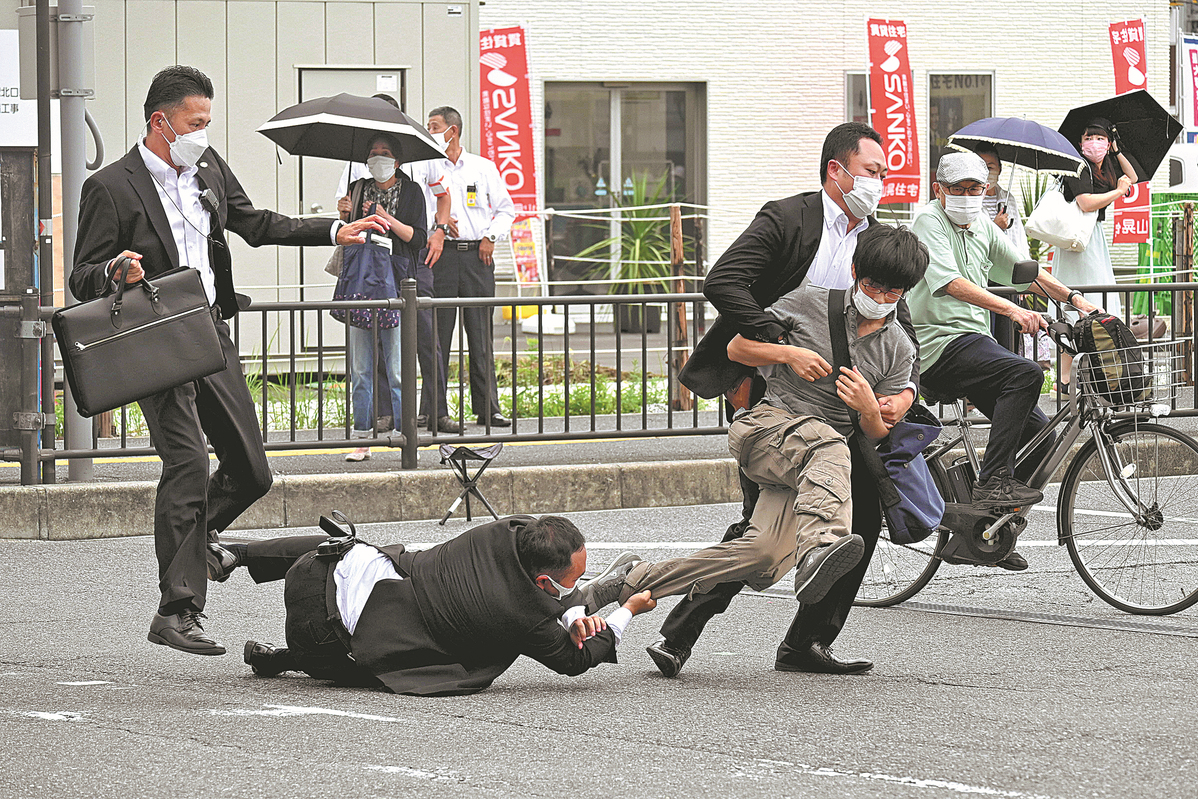Mostly gun-free nation stunned by Abe killing
China Daily | Updated: 2022-07-09 06:56

Shock voiced at home and abroad over assassination of Japan former leader
TOKYO-Japan struggled with shock on Friday, trying to come to terms with the assassination of former prime minister Shinzo Abe in a nation where firearms are strictly regulated.
Abe was shot while giving a campaign speech on a street corner in the western Japanese city of Nara and was taken to hospital by helicopter. His death was announced late on Friday.
From Abe's protege Prime Minister Fumio Kishida to ordinary people on social media, there was an outpouring of grief in a nation where political violence is so rare that the last time a former or sitting prime minister was killed was nearly 90 years ago.
"I am incredibly shocked,"Tokyo Governor Yuriko Koike told a regular news conference before Abe's death was announced.
"No matter the reason, such a heinous act is absolutely unforgivable. It is an affront against democracy."
Koki Tanaka, a 26-year-old IT worker in downtown Tokyo, voiced a similar view: "I was simply astonished that this could happen in Japan."
Responses to the shooting flooded social media, with "Abesan" the top trending topic on Japanese Twitter by afternoon.
"I can't stop shaking. This is the end of peaceful Japan," wrote Twitter user Nonochi.
Japan's gun ownership restrictions do not allow private citizens to have handguns, and licensed hunters may own only rifles. Gun owners must attend classes, pass a written test and undergo a mental health evaluation and a background check.
Unusual accident
Attacks on politicians are unusual. There has been only a handful in the last half century, most notably in 2007 when the mayor of Nagasaki was shot and killed by a gangster, an incident that resulted in further tightening of gun regulations.
Abe, Japan's longest-serving prime minister, sought to lift the economy out of chronic deflation with his bold "Abenomics" policies. He hailed from a wealthy political family that included a foreign minister father and a grandfather and a great-uncle who both served as premier.
The lawmaker first became premier in 2006, lasting just a year before returning for a rare second stint in 2012.
He launched a three-pronged "Abenomics" strategy during his leadership to beat persistent deflation and revive economic growth with hyper-easy monetary policy and fiscal spending, along with structural reform to cope with a fast-aging, shrinking population.
Deflation proved stubborn, however, and his growth strategy suffered in 2019 from a sales tax hike. The COVID-19 pandemic the following year triggered Japan's deepest-ever economic slump.
At the pandemic's onset, Abe took time to close Japan's borders and implement a state of emergency, urging people to stay home and shops to close. Critics initially branded the response clumsy and later blamed Abe for a lack of leadership.
He resigned in September 2020, but still remained a dominant presence over the ruling Liberal Democratic Party, controlling one of its major factions.
World leaders and officials also expressed shock over the assassination. Russian President Vladimir Putin on Friday called Abe's death an "irreplaceable loss".
In a telegram to Abe's family, Putin called Abe a statesman who had done a lot to develop "good neighborly ties between our countries".
French President Emmanuel Macron said:"Japan has lost a great prime minister, who dedicated his life to his country and worked to ensure order in the world."
"The brutal and cowardly murder" of Abe "shocks the world", tweeted European Commission chief Ursula von der Leyen on Friday.
"I will never understand the brutal killing of this great man," wrote European Council President Charles Michel in a separate tweet.
South Korean President Yoon Suk-yeol said the killing was an "unacceptable act of crime".
US Secretary of State Antony Blinken said the assassination was "shocking" and "profoundly disturbing".
Key moments in Shinzo Abe's life and political career
Born into a political family, Shinzo Abe had been Japan's longest-serving prime minister. Here is a look at some key moments in Abe's life and political career.
Sept 21, 1954: Abe is born in Tokyo.
1982: Pursues positions at the Foreign Ministry and with the ruling Liberal Democratic Party.
1993: First elected as LDP legislator representing the southwestern prefecture of Yamaguchi.
2005: Appointed chief cabinet secretary under prime minister Junichiro Koizumi. The same year, he is elected head of the LDP.
Sept 26, 2006: Abe becomes Japan's prime minister for the first time.
2007: Abe resigns as prime minister citing health reasons.
2012: After being elected as LDP president again, Abe becomes prime minister for the second time.
2013: Seeking to boost growth, Abe launches his "Abenomics" policies.
2014-2020: Reelected LDP leader, he serves two additional terms as prime minister.
Aug 28, 2020: Announces he will step down as prime minister after his ulcerative colitis flared up.
July 8, 2022: Abe dies after being shot during a campaign speech.
Agencies via Xinhua
























